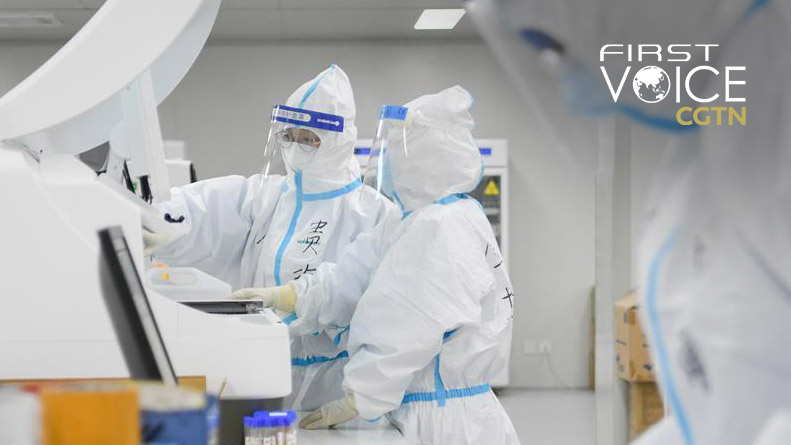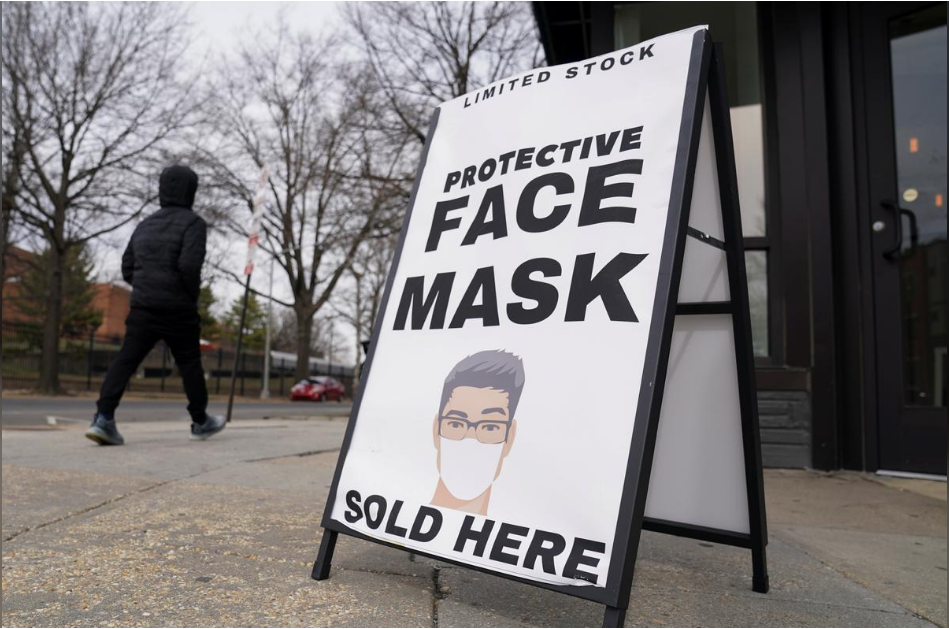
Editor's note: CGTN's First Voice provides instant commentary on breaking stories. The daily column clarifies emerging issues and better defines the news agenda, offering a Chinese perspective on the latest global events.
When answering a question from BBC on Sunday about why the country's testing ability has fallen short, UK Minister for Cabinet Office Michael Gove linked it to China not being clear about the scale of the outbreak and the "nature and infectiousness" of the disease.
However, anyone who's been following the situation in the UK should be able to tell it is only a farfetched excuse that seeks to deflect blame. The UK government's own handling of COVID-19 has so far received serious criticisms for being regrettably reactive.
One month after the lockdown of Wuhan was implemented in China, when New York Times writer Ian Johnson arrived in the Heathrow airport in London in late February, he was uneased by the fact that there was no temperature check or any health statement in place. On March 13, Graham Medley, one of the government's expert scientific advisers, was still making jaw-dropping comments about allowing a large number of people to catch the virus and generating "herd immunity." As recently as on March 19, the British government still believed that it would be "too early" to implement social distancing.
Only until very recently, the UK government's response has witnessed a U-turn as it suddenly decided to close businesses and schools, with Prime Minister Boris Johnson telling people that they "must stay at home" last week.
Pinning blame on China is clearly an attempt to shift attention away from the UK government's own confusion and slowness in responding.
Unfortunately, Gove is not alone in articulating such an idea and attempting to lay the blame on China. As the COVID-19 crisis deepens in Europe and America, this kind of rhetoric has certainly gained more traction with some politicians.

A sign showing limited stock of protective face mask in Washington, U.S., March 5, 2020. /Reuters
A sign showing limited stock of protective face mask in Washington, U.S., March 5, 2020. /Reuters
In last week's G7 summit, U.S. Secretary of State Mike Pompeo emphasized again that China is the cause for the current crisis, even going as far as saying the Communist Party of China "poses a substantial threat to our health and way of life." But a look at the current development of the situation in the U.S. and the administration's patchy response is self-explanatory as to why he made this outlandish accusation - simply to make the administration less guilty as the country's infections keep soaring. This is a development that came after the President continuously played down the threat of COVID-19 for the two months.
By playing the blame game, these politicians try to send a message that the chaotic unfolding of events in their countries were caused by China over which their own governments have absolutely no control over, and therefore, in no way should they be held responsible.
But the truth is - they should be held accountable. When these politicians criticize China for causing the predicament in their own countries, their vision simply doesn't align with the reality. China notified the WHO about the disease as early as December 31 and shared the virus' genome sequence on January 12, all of which should have bought these governments time to study the disease and avoid being dragged into a similar position as China. They were given time to respond and should have worked with scientists and medical professionals to nip such a crisis in the but they've squandered the opportunity.
A reference point is South Korea, which began developing and stockpiling test kits soon after China published the COVID-19 virus genome sequence, so when the situation worsened in the country, it was able to test more than 10,000 people a day.
So blaming China is no excuse. It not only fails to justify some governments' own slow actions but also, more dangerously, distracts them from focusing on their own issues at hand. It also risks causing more fractures with China at a time when international cooperation is most needed.
During last week's G20, there has been unprecedented solidarity in members as they vowed to combat the epidemic together. China has experienced the ferocious battle against COVID-19. It is able to offer valuable experiences in terms of what the disease is like and effective treatment. With the situation turning better here, it is also able to send other countries medical professionals as well as medical supplies to help. This should be a time for international cooperation instead of blame game and political theatre.
Script writer: Xu Sicong
(If you want to contribute and have specific expertise, please contact us at opinions@cgtn.com.)